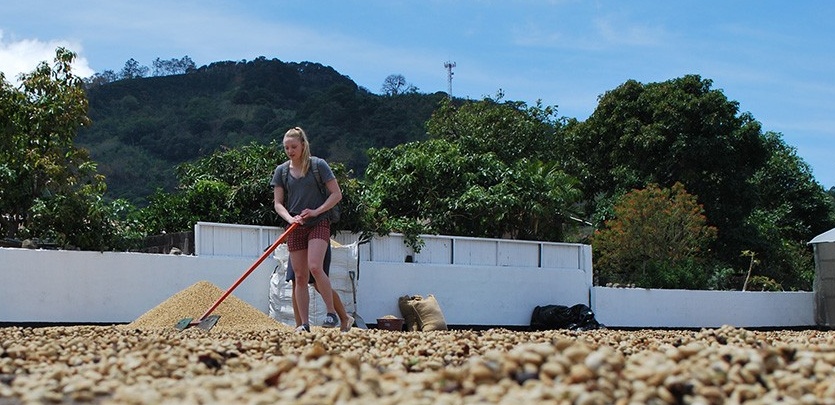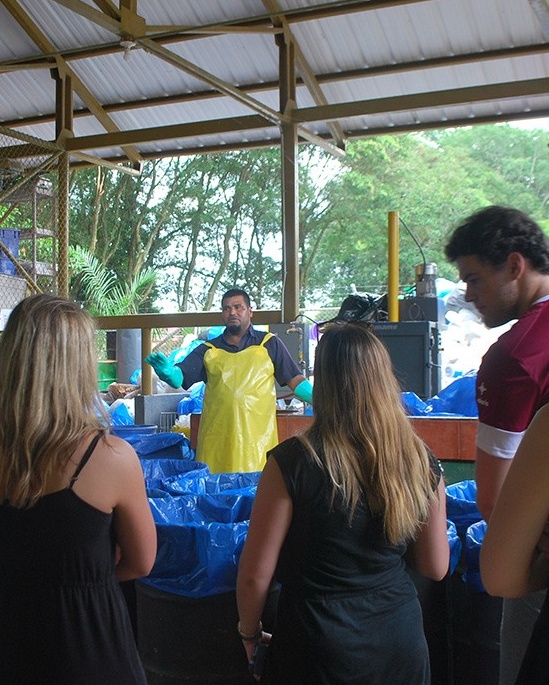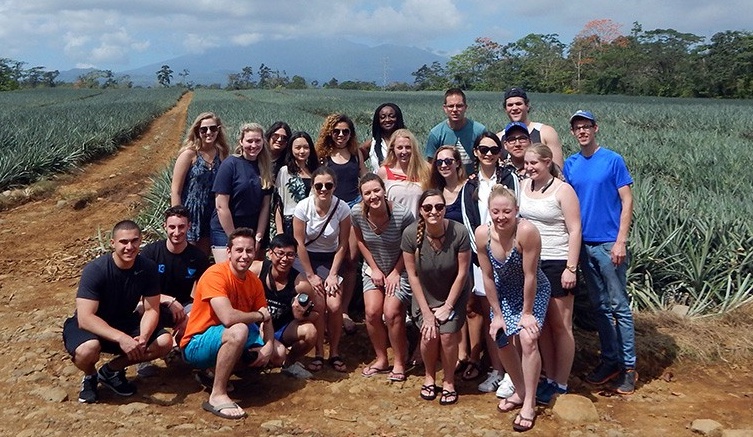Sun, startups and skill-building in Central America
By Matthew Biddle
Sarah Baxter, BS ’18, at the Coopedota Coffee Cooperative.
Less than 24 hours after touching down in Costa Rica last spring, 19 School of Management students were standing inside the Coopedota coffee production facility, learning about sustainability, social innovation and international business from the leaders of the world’s first carbon-neutral coffee cooperative.
The visit was one of many eye-opening experiences the students had during their eight-day trip to the Central American nation — all part of the newest experiential learning program offered by the School of Management.
“In today’s global business environment, experiences like those we offer in Costa Rica, Ghana and other countries are crucial for students to enhance their cultural sensitivity and broaden their perspectives,” says Dorothy Siaw-Asamoah, clinical assistant professor and director of global programs in the School of Management. She led the trip with Trevor Poag, director of global learning opportunities in the UB Office of International Education.
Throughout the experience, students visited several sites related to social innovation and entrepreneurial leadership, including Fundación Mujer, a foundation focused on gender equity and women’s empowerment; Zollner, a German electronic manufacturing services company with a facility in Cartago; Cargill, one of the largest privately held corporations on the globe; and Carao Ventures, an early-stage venture capital firm.
One of most memorable stops for sophomore Nicholas Ciavarella was the San Jose Free Walking Tour, a three-hour guided tour through the Costa Rican capital. Students met with the company founder to learn about how he built the startup, recruits tour guides and makes an impact on San Jose.
“I’ve always had entrepreneurship in my DNA — that drive to hustle and put in extra work — so I enjoyed seeing innovation in another country and gaining different perspectives on running a business,” says Ciavarella, a partner in lifestyle brand Just Dishin Hockey, who hopes to someday launch his own company.
In addition, students explored museums, attended a presentation at EARTH University and visited a pineapple plantation to learn more about agriculture, which fuels a significant portion of the country’s economy.
Above left, students visited a waste management facility to learn about sustainability. Above right, the group explored a pineapple plantation and discussed agricultural tourism and exports in Costa Rica.
“It was particularly interesting to see the juxtaposition of agricultural tourism and large corporations in Costa Rica, both of which are helping the country thrive economically,” says Taylor Speer, MBA ’18, who joined InVue Digital as a social media account manager after commencement in May. “This experience really proved to me that the world is so much bigger than we might think.”
Speer was one of three full-time MBA students who served as mentors for the 16 undergrads in the program. Prior to their trip, the entire group met once a week to prepare for their site visits and discuss such topics as strengths-based leadership and cultural competencies. During the trip, the MBAs identified key takeaways and led debrief sessions with their mentees.
“To effectively lead our teams, we developed close relationships and got to know each individual’s learning style, so we could alter our coaching styles for maximum gain,” says Emily Cavallari, MBA ’18. “Being a mentor really allowed me to develop my leadership skills and prepare for my future as a manager.”
Several students remarked that in addition to building close relationships with their peers, they also bonded with their host families, with whom they stayed for six nights. Ruben Ocana, a junior, is a native Spanish speaker, which allowed him to get to know his host family better, as well as improve his communication skills by translating for his classmates when needed.
“Living with a host family was my favorite part of the experience,” says Ocana, who returned to Costa Rica this summer for an internship. “From night one, we ate dinner together as a family, and it was interesting to talk with them about their experiences and how they viewed their own country. All of us were grateful for the kindness of our host families.”
In the end, after just eight days, the students had visited more than 10 organizations and met countless individuals, gaining greater appreciation for how culture, geography, historical issues and other factors can affect the way businesses operate in other countries.
“It’s so important to gain cultural perspective and really understand that people can be different from you and how those differences can affect a business,” says Montana Copeland, a junior in the School of Management Undergraduate Honors Program. “Our accounting program is very team-based, so we work with people from all different backgrounds and you see that cultural diversity here too. But even if there’s a language barrier or other differences, we all have to work together.”


